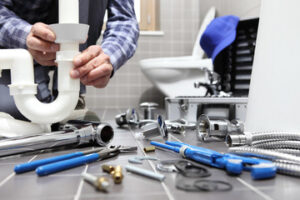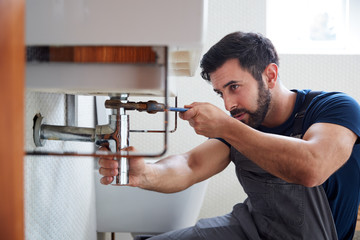Plumbers in Action: Crucial Services and Responsibilities
Plumbers play a critical role in maintaining and repairing the infrastructure that supports water supply, drainage, and heating systems in residential, commercial, and industrial properties. Their work ensures that water flows efficiently, waste is properly removed, and essential appliances function correctly.
Without the expertise and skill of plumbers, modern living would be significantly more challenging, as the availability of clean water and the removal of waste are fundamental to health and hygiene. Plumbers are trained professionals who handle a wide range of services, from installing new systems to repairing and maintaining existing ones. Their responsibilities extend beyond fixing leaks and unclogging drains; they contribute to the overall efficiency and safety of plumbing infrastructure. Contact Plumbers Sarasota for professional help.
One of the core responsibilities of a plumber is installing plumbing systems in new construction projects. This involves designing the layout of the water supply, drainage, and venting systems to ensure that they function effectively and comply with building codes and industry standards. The installation process requires careful planning and precise execution to ensure that pipes, fittings, and fixtures are correctly positioned and securely connected. Plumbers must account for factors such as water pressure, flow rates, and the placement of appliances and fixtures. They work closely with architects, contractors, and engineers to integrate the plumbing system with the overall structure of the building. Proper installation is essential to prevent future issues such as leaks, blockages, and inefficient water use.
Repairing and maintaining existing plumbing systems is another essential task performed by plumbers. Over time, plumbing systems can develop problems due to wear and tear, corrosion, and environmental factors. Leaks are among the most common issues that plumbers address. Even a small leak can lead to significant water damage and increased utility costs if left unaddressed. Plumbers use specialized tools and techniques to locate the source of the leak, which may be hidden behind walls, under floors, or within ceilings. Once the source of the leak is identified, the plumber repairs or replaces the damaged component, ensuring that the surrounding area is properly restored to prevent mold growth and structural damage.
Clogged drains and blocked pipes are also common issues that plumbers handle. Drains can become blocked due to the accumulation of debris, grease, hair, and other materials. When a drain is clogged, water flow is restricted, leading to slow drainage, unpleasant odors, and potential backups. Plumbers use various methods to clear clogs, including drain snaking, hydro-jetting, and chemical treatments. In more severe cases, they may need to dismantle sections of the drainage system to remove the obstruction manually. Once the blockage is resolved, plumbers often recommend preventive measures to minimize the risk of future clogs, such as installing drain guards or adjusting the slope of the pipes.
Water heater installation and repair are also within the scope of a plumber’s responsibilities. Water heaters provide hot water for bathing, cooking, and cleaning, making them an essential component of any plumbing system. Plumbers install different types of water heaters, including traditional tank-based models and modern tankless systems. Proper installation involves connecting the unit to the water supply and gas or electrical lines, ensuring that it operates safely and efficiently. When a water heater malfunctions, plumbers diagnose the issue, which may involve a faulty thermostat, heating element, or pressure relief valve. Repairs are conducted to restore the unit’s performance and prevent potential hazards such as leaks or scalding. In some cases, the plumber may recommend replacing an outdated water heater with a more energy-efficient model to reduce utility costs and improve overall performance.
Toilets, sinks, and other bathroom fixtures are also installed and repaired by plumbers. Installing a new toilet or sink involves securing it to the plumbing system, ensuring that the water supply and drainage connections are tight and leak-free, and testing for proper function. When a toilet or sink malfunctions, plumbers investigate the cause, which may involve a blocked drain, a damaged valve, or a faulty fill mechanism. Repairs are conducted to restore proper function and prevent water wastage. Plumbers may also recommend upgrading fixtures to more efficient models that use less water and reduce utility costs.
Gas line installation and repair are specialized tasks that require the expertise of a trained plumber. Gas lines are used to supply fuel for appliances such as stoves, water heaters, and heating systems. Installing a gas line involves laying the pipes, connecting them to the appliances, and testing for leaks and pressure levels. Safety is a top priority during this process, as gas leaks can pose serious health and fire hazards. When a gas line develops a leak or other problem, plumbers use specialized equipment to detect the source of the issue and perform the necessary repairs. Regular inspections and maintenance of gas lines are essential to ensure their safe and reliable operation.
Backflow prevention is another critical service provided by plumbers. Backflow occurs when contaminated water flows backward into the clean water supply, posing a serious health risk. To prevent backflow, plumbers install backflow prevention devices that create a barrier between the clean and contaminated water. These devices must be tested regularly to ensure that they are functioning correctly. If a backflow prevention device fails, the plumber repairs or replaces it to protect the integrity of the water supply. Plumbers also educate clients about the importance of backflow prevention and how to recognize signs of potential backflow issues.
An experienced plumber is also responsible for water pressure regulation. Low water pressure can make it difficult to perform basic tasks such as washing dishes or taking a shower, while high water pressure can damage pipes and fixtures. Plumbers diagnose water pressure problems by inspecting the plumbing system, checking for leaks, and measuring pressure levels. They may install pressure-reducing valves or adjust the existing system to achieve the optimal pressure level. By maintaining balanced water pressure, plumbers help to extend the lifespan of the plumbing system and improve overall water efficiency.
Repiping projects are another area where plumbers demonstrate their expertise. Over time, pipes can deteriorate due to corrosion, mineral buildup, or ground movement. When pipes develop leaks, cracks, or other structural problems, plumbers assess the condition of the plumbing system and determine whether repair or replacement is necessary. Repiping involves removing old pipes and installing new ones, which may be made from materials such as copper, PVC, or PEX. This process requires careful planning and execution to minimize disruption to the property and ensure that the new pipes are properly connected and sealed. Repiping can significantly improve the performance and reliability of the plumbing system.
Plumbers are also trained to handle plumbing emergencies, which require quick thinking and fast action. Burst pipes, sewer backups, and water heater failures can cause significant damage and disruption if not addressed promptly. Plumbers respond quickly to emergency calls, assessing the situation, identifying the cause of the problem, and implementing immediate repairs to prevent further damage. Emergency services often require working under pressure and in challenging conditions, but experienced plumbers have the skills and equipment to handle these situations effectively.
Routine maintenance and inspections are also part of a plumber’s responsibilities. Regular maintenance helps to identify and resolve minor issues before they develop into major problems. Plumbers inspect pipes, fixtures, and appliances for signs of wear and damage, such as corrosion, leaks, and blockages. They clean and adjust components to ensure that they are functioning correctly and efficiently. Maintenance services may also include flushing water heaters, testing backflow prevention devices, and checking for gas leaks. By conducting regular maintenance, plumbers help to extend the lifespan of the plumbing system and improve overall performance.
In addition to technical skills, plumbers also provide valuable advice and guidance to clients. They educate property owners about the proper use and care of plumbing systems, recommending ways to conserve water and reduce utility costs. Plumbers also help clients select fixtures and appliances that are energy-efficient and environmentally friendly. Their expertise and experience enable them to provide solutions that enhance the comfort, safety, and efficiency of residential and commercial properties.
In conclusion, the services and responsibilities of plumbers are essential for maintaining the functionality and safety of modern plumbing systems. From installing new systems to repairing and maintaining existing ones, plumbers ensure that water flows efficiently, waste is properly removed, and essential appliances operate correctly. Their expertise extends to gas lines, backflow prevention, water pressure regulation, and emergency response. By providing high-quality services and expert guidance, plumbers contribute to the comfort, safety, and efficiency of residential, commercial, and industrial properties. Their work is fundamental to maintaining the infrastructure that supports modern living and ensures the availability of clean water and proper waste disposal.

